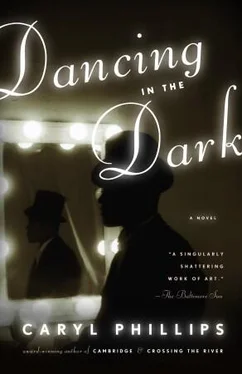It was in Detroit that he first persuaded a disapproving George that this might be a good idea. It was in Detroit that he first betrayed his father. It was in Detroit that he first pushed his hands into the pot and worked the oily substance onto his fingertips. There was a moment’s hesitation as he felt the cork slither between his delicate, oversized fingers, and then he began to smear his warm face with the cold potion. Only when he was sure that it was spread evenly across his face did he dare look up and stare into the mirror. He needed to make sure that the edges of the makeup met his hairline. He needed to give himself a consistent tone of blackness, and then he drew on his lips so that they grew beyond his own, swimming out toward his cheeks and down his chin. His lips were the final touch. He erased himself. Wiped himself clean off the face of the earth so that he found himself staring back at a stranger.
The irate woman bursts into his dressing room without knocking and she noisily demands her money. A surprised George looks up at her.
“You finished already?”
The woman holds out a purple-gloved hand and snorts. “Finished what, child? You better talk with that man.”
George pulls a thick roll of bills from the back pocket of his street pants.
“Five dollars is what we agreed on, right?”
She takes the money and tucks it into her notebook, all the while pursing her lips in disgust.
“You said you wanted me to do something special for him seeing as he’s acting all lonesome and everything, but you better let that boy know that we Detroit girls don’t appreciate you out-of-town boys acting in this fashion toward us. He don’t want something this fine, then his ignorant ass only needs to say so. No need for the man to be running off his mouth in my face like I ain’t nobody. I deserve some mannerly treatment, don’t you think?”
George looks the tan girl up and down and slowly a smile breaks out on her face.
“Sugar, I like how you is looking at me. Give me two dollars more and you can taste what your partner didn’t want.” George laughs and turns from her. “You know,” she begins, her voice now shrill with anger, “the two of you all deserve each other. Coming into my town like you all is big and mighty but you ain’t nothing but a pair of broke-down little boys masquerading as men.”
She slams the door as she leaves, and a resigned George shakes his head. He knows that his partner will be sitting by himself in his dressing room, furious with George for having arranged for a girl to visit with him. But the truth is he couldn’t think of anything else that he might offer Bert to help him out of his depression. For the past week, since he began to use the cork and play the simpleton to George’s straight man, his mood has clouded over, which makes no sense for despite George’s unhappiness with Bert making a blackfaced coon of himself he has to admit that they are now making more coin than they ever did. But Bert is struggling with what he calls his “new character,” and George had hoped that a girl might help. She was a gift, a present. He had not meant to anger his friend.
Ada looks around the spacious apartment at 107 West 132nd Street and she hopes that George will appreciate it. Afternoon light streams in through the large undraped windows and a perturbed Ada convinces herself that this is a good place for her to begin to make a home for herself and George. Bert and Lottie have already moved out of Marshall’s Hotel, and Ada has now decided that she and George will follow them uptown to Harlem. Somewhat reluctantly George has agreed to marry her, but Ada remains optimistic for she understands the seasonal changes that can quickly, and unpredictably, affect the spirits of men. She knows that George will still keep a room at Marshall’s, although he will not tell her, but Ada is determined and she will simply pretend that she knows nothing about George’s room, and she will quietly absorb the humiliation and wait patiently until the wind changes direction.
The girl waits for him by the stage door, a slender nymph whose young body looks like it could never support the weight of an overcoat. As he approaches the girl steps forward to block his path and George stops.
“It’s your child, Mr. Walker. I’m asking you, please, you have to do something to help me.”
George looks rapidly about himself. “Not here,” he hisses. “Not here where people can see.”
The girl touches his arm, her top lip quivering and water in her eyes. “Mr. Walker, I know you’re serious with the dancing lady. Everybody knows that. I seen you together with her and I ain’t fixing to make things difficult for anybody. But it’s your child, Mr. Walker and I need me some help.”
George looks at the girl, who has at least shown the good sense to steer clear of Marshall’s. He remembers her, and the disturbing cesarean zip that marks her stomach. He will help her, but she will have to wait until after the weekend. Between now and then he is occupied with plans for his wedding.
Bert soon learns to walk the twenty paces from his door to Metheney’s Bar. At first people try to talk to him for he is, the pastor aside, the best-known colored man in the neighborhood. However, they soon recognize that he is not a talking man and so they let him be. Metheney’s is a place for men who are serious about their drinking and their solitude. This is not a place for playing numbers, nor is it a place for bragging, or cursing, or womanizing. In Metheney’s, king alcohol makes no man sing. A man comes to Metheney’s to be by himself, and none more so than Mr. Williams, who sits on an undersized wooden chair at a small brown table in the far corner. There is just one chair, to prevent people from making a mistake, and as he leans forward light from the street spills over Mr. Williams’s hunched shoulders and splashes down onto the table and into his tumbler of whiskey. The barman is both tall and broad, with a roll of fat at the back of his neck. He scratches at his stubbled face, dragging a finger, like a plump brown matchstick, across his cheek and down toward the apex of his chin. Later, when Metheney wakes up and comes down to replace him, the barman will go to his rooming house, but only after he has visited the barbershop and encouraged the man to scrape off the fur with a dull razor. He will leave Mr. Williams alone, but he will make sure that the man’s glass is full before he steps out and onto Seventh Avenue. Right now he watches the local celebrity, who always sits by himself. Sometimes Mr. Williams brings in one of his seemingly endless supply of books to read, but most of the time he just sits and smokes cigarette after cigarette, his noble head clouded in tobacco. At the end of the day Bert needs time to think about what he is doing. He needs time to consider and reconsider everything that he has done, and to turn his short life over in his mind and think and drink and drink and think for there is nobody with whom he cares to talk. Not George. Not Mother. He sits and thinks and drinks by himself and colored people respect the fact that this is his way. He remembers the first time he played with a crudely assembled white medicine show out west. Waiting in the cold outside a restaurant that it was impossible for him to enter alone, hoping that a fellow performer from the company might walk by and say, “Hello, young Bert! What are you doing here?” Maybe walk in with him and give him a chance to make himself at home. But nobody came by. Back in those days, Christian charity seemed to be forever in short supply. He takes another long drink and signals to the barman for a refill. The man always offers to leave the bottle on the table for him, but Bert understands that it would not be right. After all, he would not want to disappoint his father. A nervous crease of a smile wrinkles his lips whenever he thinks of his father, way back across the country in California. He watches the barman push the stop back into the top of the bottle, and he notices that the man’s face is rough with stubble. Most likely he’ll soon visit a barbershop where talking is encouraged and easy topics are pursued with vigor. The many ways that a colored man might prevent himself from contracting syphilis. Whether skin-lightening creams really do work. Whether a plate of tripe fried in batter with hot biscuits and bacon on the side beats out a night spent removing silk slips and panties from a whole harem of willing young ladies. He watches the barman move back behind the bar, and then he looks closely at the other solitary drinkers, who all seem to relish this quiet place that throws them back upon themselves. Funny, he thinks, what men will do to release themselves from the burden of human companionship.
Читать дальше












